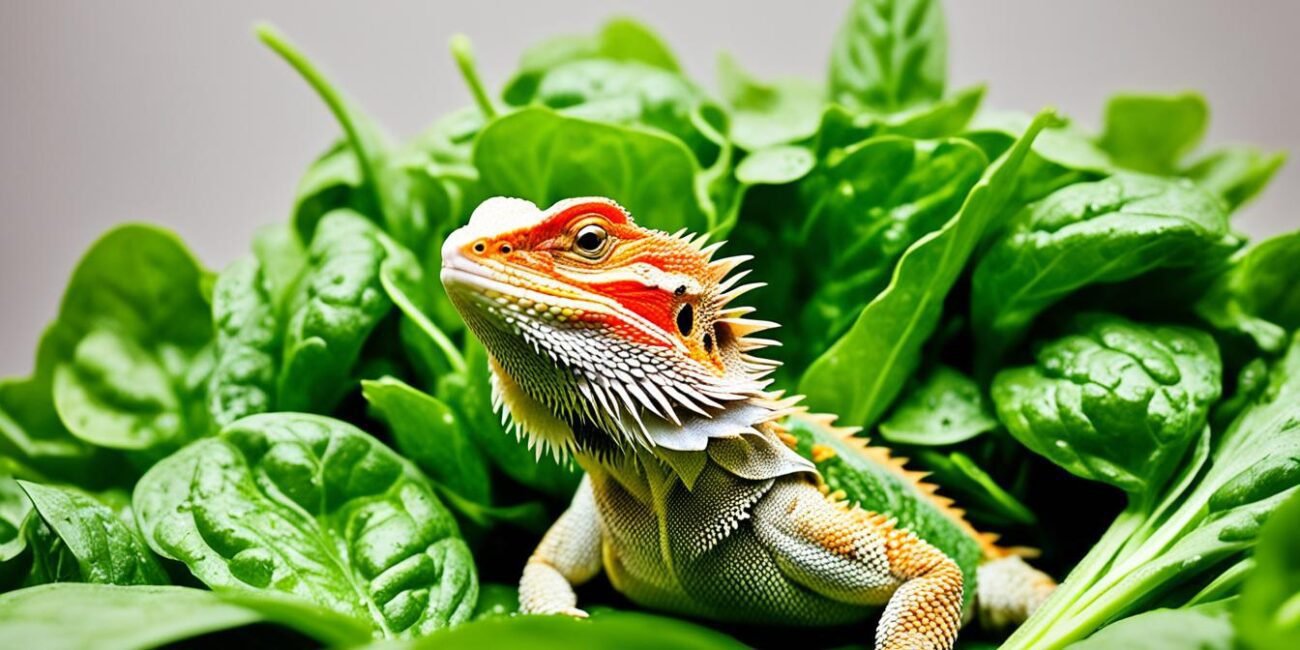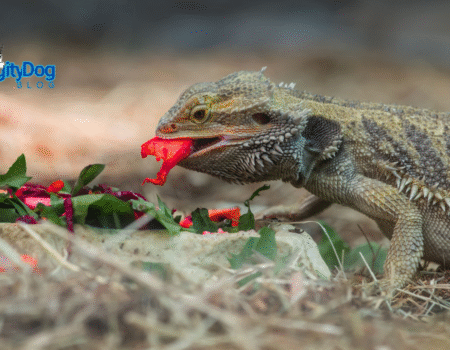“Let food be thy medicine and medicine be thy food.” – Hippocrates
When it comes to the well-being of our scaly companions, choosing the right diet is crucial. Bearded dragons are fascinating reptiles, and as pet owners, we strive to provide them with the best care possible. One common question that arises is whether bearded dragons can eat spinach. While spinach offers some nutritional benefits, it’s important to understand the facts before incorporating it into their diet.
In this article, we will delve into the feeding facts surrounding spinach for bearded dragons. We’ll explore its benefits, potential risks, and how to incorporate it into a well-balanced diet. By the end, you’ll have all the information you need to make informed decisions regarding your dragon’s dietary needs.
Key Takeaways:
- Spinach can be beneficial for bearded dragons in moderation, but it should not be a staple in their diet.
- It has a low sugar content and a healthy calcium to phosphorus ratio.
- Spinach is packed with vitamins and minerals that can boost a dragon’s health, but it also contains oxalates, which can be harmful if consumed in large quantities.
- Feeding spinach occasionally and in moderation is recommended to prevent potential health issues.
- Choosing a varied diet of safe vegetables is essential for a balanced nutritional intake for bearded dragons.
Can Bearded Dragons Eat Spinach? The Answer May Surprise You.
When it comes to feeding your bearded dragon, providing a balanced and nutritious diet is essential. Many owners may wonder if spinach can be included in their pet’s meals. The short answer is yes, bearded dragons can eat spinach, but it should be given sparingly.
Spinach contains beneficial nutrients like iron, folate, and vitamins, which can contribute to a dragon’s overall health. However, it is important to note that spinach also contains oxalates. These compounds can bind with calcium and inhibit its absorption in the dragon’s body.
Excessive consumption of oxalates can lead to metabolic bone disease, a serious condition that affects a dragon’s bone density and overall health. To prevent these issues, it is recommended to provide a variety of safe vegetables in your bearded dragon’s diet.
Benefits of spinach:
- Contains iron, folate, and vitamins
- Low sugar content
- Healthy calcium to phosphorus ratio
While spinach offers some nutritional benefits, it’s important to understand the potential risks associated with its high oxalate content.
By offering a diverse range of vegetables, you can ensure your bearded dragon receives a well-rounded and balanced diet. It’s crucial to monitor the frequency and portion size of spinach, as well as other greens, to avoid excessive oxalate intake.
| Benefits of spinach | Risks of spinach |
|---|---|
|
|
In conclusion, while bearded dragons can eat spinach, it should be given sparingly to mitigate the risks associated with its oxalate content. Incorporating a variety of safe vegetables ensures your pet receives the necessary nutrients without overloading on oxalates.
How Often Should Bearded Dragons Eat Spinach?
When it comes to feeding spinach to bearded dragons, moderation is key. Due to its high oxalate content, spinach should only be given on rare occasions to these reptiles. Some dragon keepers even opt to completely avoid feeding spinach to their pets. However, if you do choose to offer spinach as part of their diet, a few leaves every couple of months should be safe for most dragons.
It’s important to note that the frequency of spinach consumption may vary depending on the specific needs and health of your bearded dragon. If your pet has any underlying health concerns, it’s always a good idea to consult a veterinarian before introducing spinach or any other new food into their diet.
The Potential Risks of Excessive Spinach Consumption
While spinach can provide some nutritional benefits to bearded dragons, it’s crucial to be mindful of the potential risks associated with excessive consumption. Spinach contains oxalates, which can bind with calcium and inhibit its absorption in the dragon’s body. This can lead to metabolic bone disease, a serious condition that affects the dragon’s skeletal structure.
“While spinach can be a part of a bearded dragon’s diet, it should never be the sole or primary vegetable offered to them.”
Due to these risks, it’s best to provide a well-rounded diet for your bearded dragon, incorporating a variety of safe vegetables that offer a balanced nutritional profile. This will help ensure that your pet receives all the necessary vitamins and minerals without overloading on oxalates from spinach or other greens.
Offering Variety in Your Bearded Dragon’s Diet
While spinach can be an occasional addition to your bearded dragon’s diet, it’s important to explore other leafy greens that provide a better balance of nutrients. Collard greens, mustard greens, endive, and watercress are excellent alternatives that offer essential vitamins and minerals without the high oxalate content of spinach.
By including a variety of leafy greens in their diet, you can ensure that your bearded dragon receives a well-rounded and nutritious meal, promoting their overall health and wellbeing.
The Benefits and Risks of Feeding Spinach to Bearded Dragons.
Spinach offers several benefits for bearded dragons, making it an enticing addition to their diet. This leafy green has a low sugar content and is packed with essential vitamins and minerals, including vitamin A, vitamin K, iron, and calcium. The calcium to phosphorus ratio in spinach is favorable for the overall health of bearded dragons.
However, it’s important to be cautious when feeding spinach to bearded dragons due to its high oxalate content. Oxalates can bind with calcium and interfere with its absorption, potentially leading to a condition known as metabolic bone disease. To avoid these risks, it’s crucial to provide a varied and balanced diet for bearded dragons, ensuring that they don’t consume excessive amounts of spinach or other greens high in oxalates.
“Spinach provides valuable nutrients for bearded dragons, but it should be given in moderation to prevent the risk of metabolic bone disease.”
While spinach offers numerous health benefits, it’s essential to remember that balance and moderation are key when incorporating it into a bearded dragon’s diet. By combining spinach with a diverse selection of safe vegetables, you can provide your bearded dragon with a well-rounded diet that meets their nutritional needs.
Next, let’s explore whether baby spinach is a suitable alternative for bearded dragons. But first, take a look at this captivating image:
Can Bearded Dragons Eat Baby Spinach?
I frequently get asked whether bearded dragons can eat baby spinach, and the answer is yes. Baby spinach can be included in their diet, just like regular spinach. Despite the smaller and more tender leaves, the nutritional value remains the same.
Bearded dragons can eat both regular spinach and baby spinach, but it’s important to feed it in moderation regardless of its form.
One advantage of baby spinach is its softer texture, which can make it easier for dragons to consume. However, it’s crucial to remember that both regular and baby spinach contain oxalates, which can be problematic if consumed excessively.
To ensure the well-being of your bearded dragon, spinach should still be given sparingly to avoid potential health issues.
Remember, a balanced and varied diet is key for bearded dragons’ optimal health. While spinach provides certain nutrients, incorporating a wide range of leafy greens and vegetables is essential to provide a well-rounded and nutritious diet.
If you decide to include baby spinach in your dragon’s meals, take note of their overall spinach intake and closely monitor their health. If you ever have concerns or notice any unusual behavior, consulting with a veterinarian who specializes in reptiles is always a good idea.
Other Leafy Greens for Bearded Dragons.
While spinach can be included in a bearded dragon’s diet in moderation, there are other leafy greens that offer a better nutritional balance. Including a variety of safe vegetables ensures that a bearded dragon receives a well-rounded and healthy diet. Here are some other nutritious leafy greens that you can add to your dragon’s menu:
- Collard Greens: Collard greens are an excellent source of vitamins A and K, calcium, and fiber. They provide essential nutrients without the high oxalate content of spinach.
- Mustard Greens: Mustard greens are packed with vitamins A, C, and K, as well as calcium and fiber. They offer a flavorful and nutritious alternative to spinach.
- Endive: Endive is a leafy green vegetable that is low in oxalates and high in vitamins A and K. It can be a tasty addition to your bearded dragon’s diet.
- Watercress: Watercress is a nutrient-dense green that provides vitamins A, C, and K, as well as calcium and antioxidants. It is a great choice for boosting your dragon’s overall health.
These leafy greens offer a variety of vitamins and minerals that are essential for your bearded dragon’s optimal health. Remember to introduce new foods gradually and observe your dragon’s reaction to ensure they tolerate them well.
Expert Tip:
“By incorporating a variety of leafy greens into your bearded dragon’s diet, you can provide them with a wide range of essential nutrients. Experiment with different greens to find the ones that your dragon enjoys and thrives on.”
Introducing a diverse selection of leafy greens into your bearded dragon’s diet not only adds variety to their meals but also ensures they receive a balanced nutritional intake. Remember to consult with a reptile veterinarian or herpetologist for expert guidance on creating a healthy and suitable diet plan for your bearded dragon.
How to Feed Spinach to Bearded Dragons.
Feeding spinach to bearded dragons is relatively easy. When offering spinach to your pet dragon, it is recommended to choose organic spinach when possible to minimize the exposure to pesticides. Thoroughly wash the leaves to remove any dirt or impurities that could potentially harm your dragon’s health.
To ensure safe consumption, chop the spinach leaves into small, bite-sized pieces. This prevents choking and makes it easier for your dragon to eat. Place the chopped spinach in your dragon’s veggie bowl, making it accessible for them to enjoy.
Spinach can be served alone or mixed with other greens and vegetables to provide a more diverse and nutritious diet. Remember to introduce new foods gradually and observe your dragon’s response to ensure they tolerate spinach well.
It is crucial to limit the amount of spinach given to your bearded dragon and offer it only occasionally. Excessive oxalate intake, commonly found in spinach, can lead to potential health risks like metabolic bone disease. A well-balanced diet that includes a variety of safe vegetables is essential for your dragon’s overall health and well-being.
Remember, consulting with a reptile veterinarian is always recommended to ensure you are providing the best diet and care for your bearded dragon.
The Reptile Nutrition Label for Spinach.
When it comes to understanding the nutritional value of spinach for bearded dragons, it’s important to take a closer look at the reptile nutrition label. Spinach is known for its various nutrients and minerals, including vitamins A, K, and iron. These components can contribute to a bearded dragon’s overall health and vitality. However, it’s crucial to consider the potential risks as well.
Although spinach offers a beneficial calcium-to-phosphorus ratio, it also contains oxalates. Oxalates can be harmful to bearded dragons if consumed in large quantities. These compounds have the ability to bind with calcium, hindering its absorption in the dragon’s body. This interference can lead to a serious condition known as metabolic bone disease, which can affect a bearded dragon’s skeletal health and overall well-being.
While spinach provides certain nutritional benefits, the high oxalate content outweighs these advantages. Bearded dragons require a balanced diet that includes a variety of safe vegetables to maintain optimal health. While spinach can be included in their diet on occasion, it should not be relied upon as a staple vegetable due to the potential health risks associated with excessive oxalate intake.
When considering the overall nutrient composition of spinach, it’s crucial to remember that a bearded dragon’s diet should consist of a diverse range of safe vegetables. This helps to ensure that they receive all the necessary vitamins and minerals without overloading them with oxalates from spinach or other greens.
The Pros and Cons of Feeding Spinach to Bearded Dragons:
- Pros:
- Rich in vitamins A, K, and iron
- Provides a beneficial calcium-to-phosphorus ratio
- Contributes to overall health and vitality
- Cons:
- Contains oxalates that can bind with calcium
- Excessive oxalate intake can lead to metabolic bone disease
- Should not be relied upon as a staple vegetable
Alternative Greens for Bearded Dragons:
While spinach can be included in a bearded dragon’s diet in moderation, there are other leafy greens that offer a better nutritional balance. Consider incorporating collard greens, mustard greens, endive, and watercress into their meals. These greens provide essential vitamins and minerals without the high oxalate content found in spinach. By offering a variety of leafy greens, you can ensure that your bearded dragon receives a well-rounded and healthy diet.
Why Spinach Should Not Be a Staple Veggie for Bearded Dragons.
While spinach is a source of essential nutrients, it is not recommended as a staple vegetable in a bearded dragon’s diet. The high oxalate content in spinach can interfere with calcium absorption, leading to potential health issues such as metabolic bone disease.
Excessive consumption of spinach can also increase the risk of Vitamin A toxicity in bearded dragons. Therefore, it is important to provide a diverse range of safe vegetables to ensure proper nutrition and minimize the potential risks associated with spinach consumption.
By incorporating various leafy greens into their diet, bearded dragons can receive a balanced array of vitamins, minerals, and fiber without overloading on oxalates. This promotes their overall health and reduces the chances of developing calcium-related complications.
“Spinach, while beneficial in moderation, should not be the primary vegetable in a bearded dragon’s diet. It’s all about maintaining a nutritional balance for their well-being.”
Instead of relying heavily on spinach, consider integrating other safe and nutritious greens into your bearded dragon’s meal plan. Collard greens, mustard greens, endive, and watercress are excellent alternatives that provide a broader spectrum of essential nutrients without the high oxalate levels found in spinach.
Remember, a varied diet is key to ensuring the optimal health and vitality of your bearded dragon. By offering a diverse range of safe vegetables, you can create a balanced and nutritious feeding regimen that supports their well-being and minimizes potential health risks.
Metabolic Bone Disease and Other Potential Risks.
Metabolic bone disease is a serious condition that can occur in bearded dragons due to a lack of calcium and improper calcium to phosphorus ratio. It is a common ailment that can lead to weak bones, fractures, and even death if left untreated. As a responsible owner, it is crucial to understand the risks associated with certain foods, including spinach, and take necessary precautions to prevent the development of metabolic bone disease in your beloved pet.
Excessive consumption of spinach, with its high oxalate content, can contribute to the development of metabolic bone disease in bearded dragons. When too many oxalates bind with calcium in the dragon’s body, it interferes with calcium absorption. This inhibits the essential role calcium plays in bone formation and maintenance, leading to weakened skeletal structure and potential bone deformities.
To protect your bearded dragon from metabolic bone disease, it is important to provide a balanced diet that includes safe vegetables with appropriate calcium to phosphorus ratios. While spinach does contain valuable nutrients such as vitamins A, K, and iron, its high oxalate content outweighs the potential health benefits when overfed. Instead, focus on offering a variety of safe vegetables that provide optimal nutrition for your reptile.
It is crucial to provide a balanced diet, monitor calcium intake, and consult a vet if any symptoms of metabolic bone disease or other health issues are observed.
– Reptile Health Magazine
The Importance of Calcium and Vitamin D3
Calcium is an essential mineral for the proper growth and development of bearded dragons. It is the key building block for strong bones and plays a crucial role in various physiological processes. However, calcium can only be effectively absorbed and utilized in the presence of vitamin D3. Vitamin D3 is responsible for regulating calcium levels in the body and promoting its absorption from the digestive system.
Without sufficient calcium and vitamin D3, bearded dragons are at risk of developing metabolic bone disease. The condition often manifests as soft or rubbery bones, limb deformities, difficulty walking or climbing, and lethargy. If left untreated, it can progress to more severe complications and compromise the overall health and well-being of your dragon.
Ensuring adequate calcium and vitamin D3 intake is essential in preventing metabolic bone disease and promoting optimal bone health in bearded dragons. Incorporating calcium-rich foods, such as calcium dusted insects and calcium supplements, into their diet can help meet their calcium requirements. Additionally, providing access to appropriate UVB lighting is crucial for the natural synthesis of vitamin D3 in their skin.
Preventing Metabolic Bone Disease: A Holistic Approach
Preventing metabolic bone disease in bearded dragons requires a holistic approach that encompasses proper nutrition, adequate UVB exposure, and regular veterinary check-ups. While spinach can provide certain health benefits, it should be fed sparingly due to its high oxalate content and potential to contribute to calcium deficiencies.
Here are some key guidelines to help safeguard your bearded dragon’s bone health:
- Offer a diverse range of safe vegetables with balanced calcium to phosphorus ratios.
- Supplement their diet with calcium-rich foods and vitamin D3 supplements as recommended by a reptile veterinarian.
- Ensure proper UVB lighting to support vitamin D3 synthesis.
- Monitor your dragon’s weight, behavior, and overall health for any signs of metabolic bone disease.
- Schedule regular check-ups with a reptile veterinarian to assess your dragon’s overall health and bone density.
By following these guidelines, you will be providing your bearded dragon with the best possible chance of enjoying a healthy and thriving life, free from the risks of metabolic bone disease.
| Key Points: |
|---|
| Metabolic bone disease can occur due to a lack of calcium and an improper calcium to phosphorus ratio in a bearded dragon’s diet. |
| Excessive consumption of spinach, with its high oxalate content, can contribute to the development of metabolic bone disease. |
| The presence of calcium and vitamin D3 is crucial for proper bone development and maintenance. |
| Preventing metabolic bone disease requires a holistic approach, including a balanced diet, adequate UVB exposure, and regular veterinary check-ups. |
Feeding Tips for Bearded Dragons.
When it comes to feeding bearded dragons, providing them with a well-rounded and nutritious diet is essential for their health and well-being. Incorporating a variety of safe vegetables, including spinach in moderation, can contribute to a balanced meal plan. However, it’s important to keep a few feeding tips in mind to ensure your dragon’s optimal health.
First and foremost, consider the age and development stage of your bearded dragon. Younger dragons have different nutritional requirements compared to adults, so the frequency and amount of feedings should be adjusted accordingly. While older dragons can enjoy spinach occasionally, it is essential to moderate their intake due to its high oxalate content.
When feeding spinach or any other vegetables to your bearded dragon, it is crucial to cut the food into small, bite-sized pieces. This will not only prevent choking but also make it easier for your dragon to consume and digest the food. Additionally, maintaining the optimal calcium to phosphorus ratio in their diet is important for their overall bone health.
To ensure the best care for your bearded dragon, regular vet check-ups and consultations are highly recommended. A qualified reptile veterinarian can provide expert advice on the feeding needs of your dragon, including the inclusion of spinach and other vegetables in their diet. By following these feeding tips and seeking professional guidance, you can help keep your bearded dragon healthy and thriving.
FAQ
Can bearded dragons eat spinach?
Yes, bearded dragons can eat spinach, but it should be given sparingly and in moderation.
How often should bearded dragons eat spinach?
Spinach should be given to bearded dragons on rare occasions, such as a few leaves every couple of months.
What are the benefits and risks of feeding spinach to bearded dragons?
Spinach is packed with vitamins and minerals, but it also contains oxalates, which can be harmful if consumed in large quantities.
Can bearded dragons eat baby spinach?
Yes, bearded dragons can eat baby spinach. It may be easier for them to consume due to its softer texture.
What are other leafy greens that bearded dragons can eat?
Other safe and nutritious leafy greens for bearded dragons include collard greens, mustard greens, endive, and watercress.
How should I feed spinach to bearded dragons?
It is recommended to choose organic spinach, wash the leaves thoroughly, chop them into small pieces, and offer them in the dragon’s veggie bowl.
What is the nutritional value of spinach for bearded dragons?
Spinach contains beneficial nutrients like iron, folate, vitamins A and K, but it also has a high oxalate content.
Why should spinach not be a staple veggie for bearded dragons?
The high oxalate content in spinach can interfere with calcium absorption and potentially lead to metabolic bone disease.
What are the potential risks associated with feeding spinach to bearded dragons?
Excessive consumption of spinach can increase the risk of metabolic bone disease and Vitamin A toxicity in bearded dragons.
What are some feeding tips for bearded dragons?
It is important to provide a balanced diet, monitor calcium intake, and consult a vet if any health issues are observed.










No Comment! Be the first one.